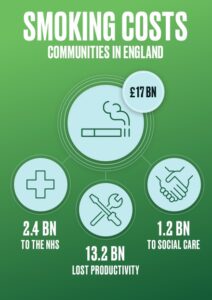The Real Costs Of Smoking Health:

Introduction:
When we think about the real costs of smoking: health, money, and life, the first and most serious cost is our health. Smoking damages almost every organ in the body and slowly reduces the quality of life.
It does not only affect the lungs but also the heart, blood vessels, skin, and even the immune system.
Each cigarette carries harmful chemicals that weaken the body over time.
Understanding the health impact of smoking is the first step to realizing why quitting is so important. By stopping, we protect our body, live longer, and avoid suffering from diseases that smoking can cause.
Damage to Lungs:
Smoking directly enters the lungs with harmful chemicals. These toxins damage lung tissue, leading to chronic coughing, breathing problems, and diseases like chronic bronchitis. Many smokers also face a high risk of lung cancer, which is one of the deadliest outcomes of this habit.
Heart and Blood Vessel Problems:
When we smoke, nicotine narrows the blood vessels and raises blood pressure. This constant stress on the heart leads to strokes, heart attacks, and long-term cardiovascular disease.
The danger is not only for older people; even young smokers can face sudden heart problems.
https://pubmed.ncbi.nlm.nih.gov/9321534/
One of the real costs of smoking: health, money, and life are the serious damage smoking causes to the heart and blood vessels.
Every puff of a cigarette sends dangerous chemicals like nicotine and carbon monoxide into the bloodstream.
This is why doctors say the heart carries a heavy share of the real costs of smoking: health, money, and life. But the good news is that quitting smoking can slowly repair the body. Within a few weeks of quitting, blood pressure improves, circulation becomes better, and the risk of heart disease starts to drop.

Weakening Immunity:
Another part of the real costs of smoking: health, money, and life is how smoking weakens our immunity. The immune system is like the body’s defence army, protecting us from germs, viruses, and infections. But when we smoke, harmful chemicals reduce the power of this defines.
Smokers often catch flu, cough, and chest infections more easily than non-smokers. Even small wounds or illnesses take longer to heal because the body cannot fight properly. This means a smoker spends more days feeling sick and tired.
This shows that weakening immunity is not just a small problem, but a major part of the real costs of smoking: health, money, and life.
The good news is that when a person quits smoking, the immune system slowly gets stronger again. Within weeks, the body starts to defend itself better, and health improves.
Impact on Skin and Appearance:
One visible part of the real costs of smoking: health, money, and life is how it changes the skin and overall appearance. Smoking reduces the flow of oxygen in the blood, which makes the skin look dull and lifeless.
Over time, this leads to early wrinkles and faster aging.
The impact is not just cosmetic it is a reminder that the body is suffering inside and outside. Looking older than the actual age is one of the clear warnings of smoking’s harm.
By quitting, the skin slowly starts to heal. Blood flow improves, and the natural glow of the skin can return. This proves that even appearance is closely tied to the real costs of smoking: health, money, and life.
The Real Costs of Smoking Money:
Another major part of the real costs of smoking: health, money, and life is the huge financial burden smoking creates. Many people think smoking only costs the price of a cigarette pack, but the truth is much bigger.
Daily Spending:
Even buying one pack a day adds up to a large amount every month. Over a year, the money spent on cigarettes could be used for healthier food, education, or family needs. This daily expense silently eats away at savings.
Medical Costs:
Smoking damages the lungs, heart, and immune system. Treating these problems requires costly hospital visits, medicines, and sometimes surgery. Families often struggle to manage these medical bills, which is another heavy cost of smoking.
Work and Productivity Loss:
Smokers often fall sick more often and take extra days off work. Some employers even charge higher insurance premiums for smokers. This reduces income and affects long-term financial security.
All of these show that money is a big part of the real costs of smoking: health, money, and life. Quitting smoking does not only improve health but also saves thousands in the long run.
The Real Costs of Smoking Life:
Shorter Lifespan:
Studies show that smoking reduces life expectancy by many years. Each cigarette reduces a person’s life bit by bit.
Impact on Family:
Smoking does not only hurt the smoker; it also harms loved ones. Second hand smoke affects children, partners, and friends. Families suffer emotionally and financially when a loved one develops smoking-related disease.
Quality of Life:
Even before death, smoking lowers quality of life. Breathlessness, pain, fatigue, and constant health issues reduce happiness and freedom. Smokers may not enjoy walking, playing with children, or traveling as they once did.
The Hidden Costs of Smoking:
When we talk about the real costs of smoking: health, money, and life, many people only think about buying cigarettes. But there are many hidden costs of smoking that most of us forget to notice.
Family Impact:
Smoking does not only harm the smoker. Second hand smoke puts family members, especially children, at risk of asthma, lung infections, and other diseases. This creates more hospital visits and extra spending.
Social and Emotional Costs:
Smoking often causes stress in relationships. Family members may worry about the smoker’s health or feel burdened by medical expenses. These emotional struggles are also part of the hidden costs.
Loss of Opportunities:
Some jobs prefer non-smokers because smoking is linked with poor health and more sick leaves. This means smokers may lose better opportunities, promotions, or even face higher insurance costs.
Quality of Life:
Smoking reduces energy, taste, and stamina. Everyday activities like climbing stairs, playing with kids, or exercising become harder. This silent damage lowers life satisfaction, which is another hidden cost.
So, the hidden costs are not only about money—they affect family, opportunities, and overall happiness. That’s why quitting helps save more than we can se
Why Quitting Matters?
Quitting smoking immediately starts to repair the body. Within hours, heart rate and blood pressure begin to return to normal. Within weeks, lung function improves. Over years, the risks of cancer, heart disease, and stroke go down.
Quitting also saves money and improves family relationships. It shows strength, care, and responsibility for one’s health and loved ones.
Simple Steps to Quit Smoking:
Quitting smoking is not easy, but it is possible when we take small steps every day. Understanding the real costs of smoking: health, money, and life can give us strong motivation to stop. Here are some simple steps:
1. Set a Clear Goal:
We should decide a specific date to quit. Writing it down makes the goal real and helps us stay focused.
2. Avoid Triggers:
Often, smoking is linked with certain places, friends, or habits. We can avoid those triggers by changing our routine, such as drinking water or chewing gum instead.
3. Seek Support:
Family, friends, or support groups can encourage us when cravings are strong. Talking about our journey makes it easier to stay on track.
4. Replace Smoking with Healthy Habits
Instead of reaching for a cigarette, we can try deep breathing, walking, or eating fresh fruits. These habits reduce stress and keep us busy.
5. Celebrate Progress:
Every smoke-free day is a victory. We can reward ourselves with something healthy or save the money we would have spent on cigarettes.
Quitting may be tough, but the reward is priceless. We gain better health, save money, and protect our loved ones. These steps help us break free from the hidden trap of smoking.
FAQs on the Real Costs of Smoking: Health, Money, and Life
Q1: What is the biggest health risk of smoking?
Answer:
The biggest risk is cancer, especially lung cancer, followed by heart disease and stroke.
Q2: How much money can a smoker save by quitting?
Answer:
Depending on local cigarette prices, a smoker can save thousands every year by quitting.
Q3: Does secondhand smoke really affect others?
Yes, secondhand smoke causes breathing problems, asthma, and even cancer in non-smokers.
Q4: Can the body recover after quitting smoking?
Answer:
Yes, the body starts healing within hours, and long-term benefits grow over time.
Q5: Is smoking ever safe in small amounts?
Answer:
No, even a few cigarettes a day increase the risk of serious diseases.
Conclusion
When we look at the real costs of smoking: health, money, and life, the picture is clear. Smoking harms the body, empties pockets, and reduces both lifespan and happiness.
It is not just a personal choice but a risk that affects families, friends, and society. Quitting is the best decision a smoker can make. Every cigarette avoided adds more health, more wealth, and more life.